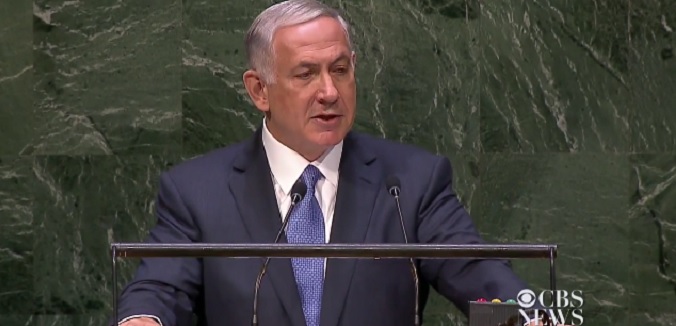Israeli Prime Minister Benjamin Netanyahu on Monday spoke at the opening of the United Nations General Assembly, giving a speech that the Jerusalem Post described as “vintage Netanyahu,” and one that leaned heavily on what has become the consensus understanding of the Middle East as divided into three regional blocs. Video, audio, and a text transcript of the speech can be found here, here, and here respectively.
The Israeli leader described a Middle East torn between Sunni extremism on one side, Shiite extremism on another, and the U.S.’s traditional Arab and Israeli allies on a third. Netanyahu went on to further describe the camp of Sunni extremists – conventionally taken to include Turkey, Qatar, the Muslim Brotherhood, and various jihadist groups including Al Qaeda – to include the Islamic State and the Palestinian terror group Hamas:
They evidently don’t understand that ISIS and Hamas are branches of the same poisonous tree.
ISIS and Hamas share a fanatical creed, which they both seek to impose well beyond the territory under their control. Listen to ISIS’ self-declared caliph, Abu Bakr al-Baghdadi. This is what he said two months ago: A day will soon come when the Muslim will walk everywhere as a master. The Muslims will cause the world to hear and understand the meaning of terrorism and destroy the idol of democracy. Now listen to Khaled Mashal, the leader of Hamas. He proclaims a similar vision of the future: We say this to the West — by Allah you will be defeated. Tomorrow our nation will sit on the throne of the world.
As Hamas’ charter makes clear, Hamas’ immediate goal is to destroy Israel, but Hamas has a broader objective. They also want a caliphate.
Turning toward the Shiite extremist camp – made up of Iran and its various regional proxies, including Hezbollah, Syria, and Iraq – Netanyahu pushed further, declaring that Tehran’s drive toward nuclear weapons posed a strategic threat to the region of qualitatively greater magnitude than that posed by Sunni extremists such as ISIS:
A nuclear armed Iran, he stressed, would be even more dangerous than the IS terrorists that now ride “in the back of pickup trucks.” IS must be defeated, Netanyahu summed up, but “to defeat ISIS and leave Iran as a threshold nuclear power is to win the battle and lose the war.”
The Israeli leader also emphasized that while the two groups compete in particular theaters, they have been known to cooperate just as often: “for 50 days this past summer Hamas fired thousands of rockets at Israel, many of them supplied by Iran.”
The emphasis gestured toward a turn of phrase that has been circulating in Washington D.C. policy circles, under which Sunni and Shiite radicals are not so much enemies as competitors. Analysts have in recent months separately documented how Iranian proxies in Syria – up to and including the Assad regime – have cooperated with Sunni extremist groups to squeeze out moderates who would oppose both Sunni and Shiite radicals.
Netanyahu sought to align Israel and the bloc of so-called Arab pragmatists – Egypt, Saudi Arabia, much of the rest of the Gulf, Jordan, and allied elements – opposite the extremist camps. The position is not a new one for Netanyahu – he flagged it in a major foreign policy address given earlier in September – but the Israeli leader has become increasingly explicit in attempting to consolidate potential alliances with Arab states threatened by Iranian proxies and by Sunni jihadist groups.
During his Monday speech he doubled down on the vision, calling on Israel’s neighbors to embrace a “fresh approach” to normalization and regional peace based on shared interests, one that would “take into account new realities and new roles and responsibilities for our Arab neighbors.”
[Photo: CBSNews.com / YouTube]




